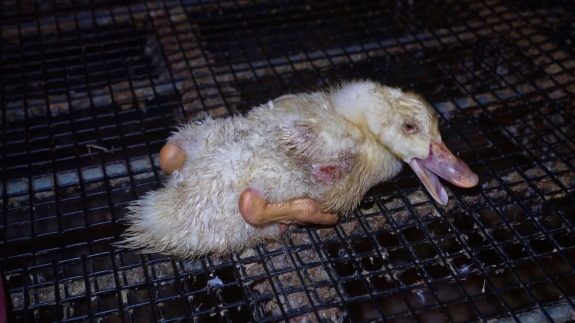On February 18, 2020, shocking footage of animal cruelty emerged from inside a King Cole Ducks factory farm in Whitchurch-Stouffville, Ontario. Animal advocates held a protest outside the farm Ontario, and some of those present then entered a dimly lit, windowless barn on the property to document the conditions in which thousands of ducks were living.
What they saw was shocking. Images and videos live streamed from inside the facility are gruesome and difficult to watch. Ducks were shown living on a barren wire mesh floor covered in feces. They had no access to the outdoors or to open water for swimming. Several ducks had their wings and bills stuck in the mesh flooring, in obvious distress and unable to move. Others had visible injuries. Dead ducks in various stages of decomposition were shown lying next to living ducks.

King Cole markets its products as “natural” and “humane”
The horrific conditions revealed at King Cole stand in sharp contrast to the claims and images displayed on King Cole’s website, and on its packaging. King Cole, which slaughters 2.5 million ducks each year, claims to be a “family owned” company that uses “natural” and “traditional” farming practices. It claims to be “heralded for its leadership” in animal care. It markets itself using images of open pastures and ducks enjoying the outdoors.
But the truth is much different. The ducks shown in the footage had no access to open water, with drinking water available only in nipple drinkers. Ducks are a water-oriented species, making this highly unnatural. Without access to open water for swimming, eating, bathing, and preening, ducks can suffer significant physical and psychological harm, including leg and foot injuries, abnormal behaviours such as head shaking and compulsive preening, and increased risk of infections.
Until these real-life photos and videos inside King Cole were released, the company’s website falsely claimed that all of its barns were “bedded down with recycled fresh wood shavings daily and washed out for maximum sanitary conditions.” There was no bedding at all in the barn the where the footage was taken. No surprise, then, that at some point after they were exposed for cruelty, King Cole quietly changed its website, which now states that “many” of its barns have bedding, while “others” are washed out for sanitation.
Misleading marketing is bad for consumers and animals
Animal Justice was not involved in efforts to enter King Cole’s barn and obtain this footage, but given the sickening cruelty exposed by that day, we decided we had to act to stop King Cole from illegally misleading consumers. That’s why we’ve filed a complaint with the Competition Bureau of Canada and the Canadian Food Inspection Agency, asking these agencies to take action to protect consumers from King Cole’s animal cruelty cover-up.
Canadian consumers care about the welfare of animals, and many people prefer to buy animal products with labels suggesting that animals were cared for in a “humane” or “natural” manner. From “cage free” eggs to “free range” chickens and “grass fed” beef, many marketing terms are unfortunately unregulated, leaving consumers misinformed, often believing that animals are treated far better than they actually are on farms and during slaughter.
Companies use these “humane-washed” labels to convince consumers to buy animal products, or even to pay more for products with these labels. King Cole and other companies have a financial motivation to make claims regarding the humane treatment of animals, building trust with consumers and influencing their purchasing decisions.
Of course, King Cole is not alone in its use of misleading claims and images in its marketing materials and packaging. Animal Justice and other animal protection groups have documented rampant false animal welfare claims on food products in the Canadian marketplace, and Animal Justice regularly files false advertising complaints against companies that lie about their abuse of animals.
Consumers should be protected from false and misleading claims
King Cole, as well as Ontario’s Minister of Agriculture, predictably dismissed the citizens who entered the barn as trespassers, saying nothing about the animal suffering that was exposed. But how the footage was obtained makes it no less necessary to address the appalling conditions that it shows.
Canada has no laws to regulate the condition of animals on farms, and no proactive government inspections to monitor on-farm animal welfare. Without government oversight, consumers will continue to be left in the dark when it comes to the treatment of animals raised and slaughtered for food. To make matters worse, Ontario is proposing to follow the lead of Alberta and introduce a dangerous and unconstitutional “ag gag” law—prohibiting employee whistleblowers from publicly exposing animal abuse and cruelty.
This lack of oversight makes it all the more important that the CFIA and Competition Bureau take action to enforce labelling and competition laws on the rare occasion when footage emerges, showing that a company’s claims regarding its treatment of animals are demonstrably false and misleading. Consumers have a right to know how animals are treated, and companies that mislead the public to increase their profit margins deserve to be charged and prosecuted for their illegal activities.
Join the Animal Justice mailing list






